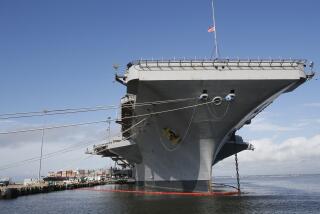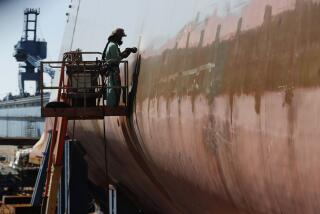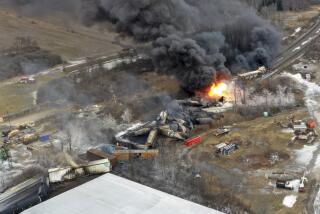Unglamorous Jobs Are Neglected at Peril
- Share via
The explosion of the mine that blew a hole in the tanker Bridgeton almost sank, overnight, the U.S. policy of escorting re-registered ships in the Persian Gulf.
The incident also handed the Iranians, who were almost certainly responsible for the mining, a significant propaganda coup. And it has unquestionably fueled the unease among Capitol Hill opponents of the whole policy of re-registering and escorting Kuwaiti merchant vessels.
The ironic part of the whole incident is that the question of mines in the Persian Gulf was assigned such a low priority on the Navy’s operational agenda, almost to the point of oversight.
This is not the first time recently that an oversight by military planners has in some measure inhibited military operations. In 1979 the lack of effective sand filters for the CH-53 Sea Stallion helicopters employed on the hostage rescue mission in Iran resulted in the forcing down of at least one, and possibly two, of the craft when sand clogged the engines. The operation ended in disaster. In 1982 the recently recommissioned battleship New Jersey was stationed off the coast of Lebanon in support of the Marines who were ashore outside Beirut. The New Jersey has nine 16-inch main guns that fire a projectile weighing 2,700 pounds a distance of 23 miles. The Marines were being shelled from Druze artillery positioned high in the Shouf mountains. The U.S. Army’s counterbattery fire-control radar accurately pinpointed the Druze positions. But, through an oversight, the Army’s computers could not interface with those on the New Jersey, making pinpoint counterfire impossible. The 16-inch shells landed in the near-vicinity of Druze positions that were always deliberately situated in close proximity to Lebanese villages--with the consequent results.
There is no doubt that the planning of a military mission on the scale of the Persian Gulf escort is vast and complicated. The United States had prepared contingency plans for the neutralization of Iran’s Silkworm missile batteries, should they be activated. Combat air patrols were flown by U.S. carrier-borne aircraft over the convoy. All aircraft operating over the gulf are monitored to prevent an air-launched missile attack that so graphically crippled the frigate Stark. And crews aboard the escort ships had small arms and heavy-caliber machine guns ready to fight off the growing threat of Iranian Revolutionary Guards using speedboats to attack shipping.
But, as for mines in the shipping channels, there appears to have been little thought given to the potential problem.
Mine-clearing equipment is now being rushed into the region, and efforts are under way to formulate some type of short-term policy, which is almost like shutting the gate after the horse has bolted. Secretary of Defense Caspar W. Weinberger’s flying-in-the-face-of-the-facts comment that “we did not look in that area because there have never been any mines in that area” almost adds insult to injury.
Mining of international waters is an offense against all who use the sea lanes. As such, the response in the Persian Gulf should be international in origin and operation. Kuwaiti and Saudi minesweepers should be deployed outside their territorial waters to assist the U.S. Navy. Requests should also be made for additional international assistance from the British, the French and the Soviets if necessary.
The Bridgeton incident has clearly demonstrated two major vulnerabilities of the U.S. military as a whole. From a practical viewpoint, minesweeping and mine countermeasures do not have the same glamorous appeal as flying off a carrier, working aboard a Trident submarine or even aboard one of the newly recommissioned battleships. Nevertheless, the ability to effectively counter the threat of mines--and not just in the Persian Gulf--must become a high priority. Despite all the massed firepower of the various fleets, a simple, relatively cheap mine placed in the right place can seriously damage both the Navy’s surface fleet and its credibility to undertake naval operations.
The mining incident also illustrates from a planning viewpoint that operations like mine countermeasures are just not accorded the same priority and resources as other equally vital functions within the Navy. This lesson should be learned throughout all the services. They possess abilities to operate and fight that are paralleled only by those of the Soviet Union. Yet our operations can be compromised because certain vital tasks are not given commensurate priority.
If this is a failure of our system of military education--that only the glamorous jobs receive substantial funding and personnel--then the current predicament or past incidents in Iran and Lebanon will undoubtedly repeat themselves. More significantly, they have the potential to cost U.S. servicemen their lives.
More to Read
Sign up for Essential California
The most important California stories and recommendations in your inbox every morning.
You may occasionally receive promotional content from the Los Angeles Times.










